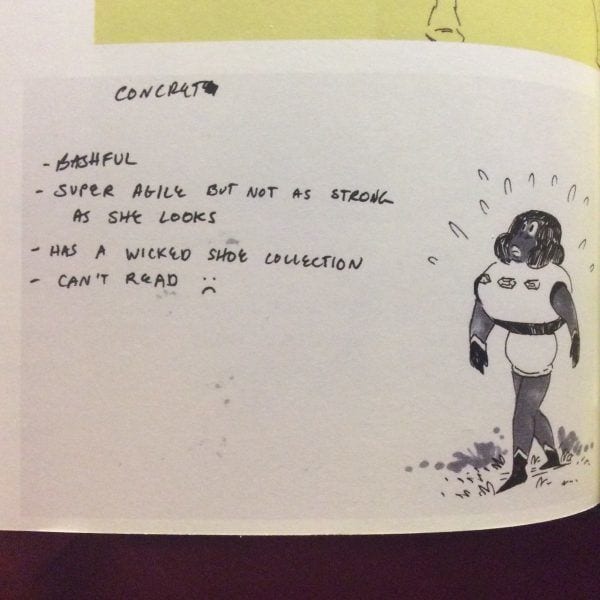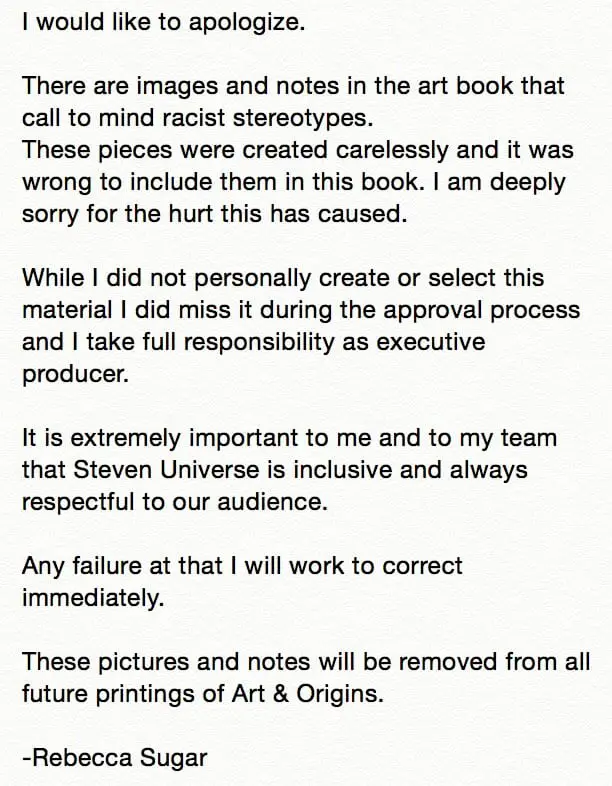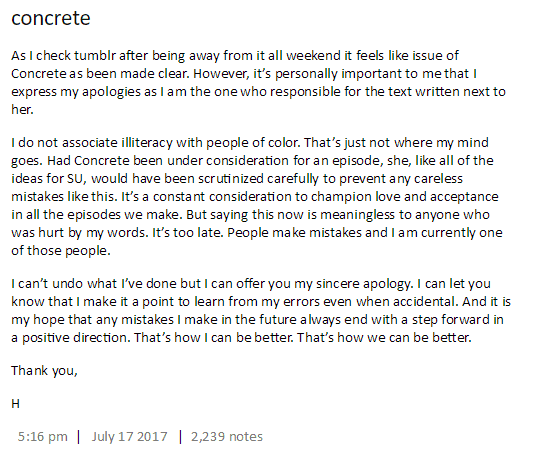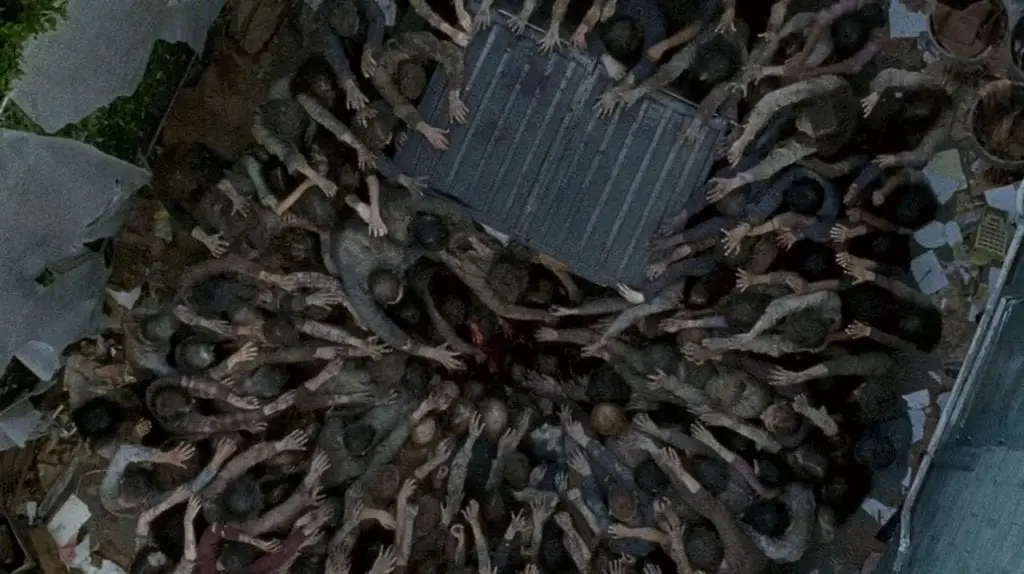An inevitable responsibility for anyone telling a story is the need to interact with a fandom. If you are fortunate enough to have people give a crap about your story, those people are going to have opinions. They will engage with your story on multiple levels. They will ask questions about said engagement. You’ll have to deal with developments people love, developments people hate, criticisms of your style, and fans shipping your characters. You will have to engage in turn with these fans.
A variety of pitfalls wait to trip anyone involved in a piece of media when it comes to engaging with fans. Even the choice not to engage is a choice in how you interact with your fans. Another part of this is the inevitability of controversy, and having to choose how you respond. How do you balance defending intent and empathizing with your audience’s concerns? The wrong response only makes fans angrier, which leads to resentment on both sides and lost faith of the fans towards the storyteller.
The past couple of weeks saw two separate controversies with shows we love here at The Fandomentals: Steven Universe and Supergirl. While the controversies were different, they serve as a fairly apt microcosm for how you should and should not engage with a fandom. In Supergirl’s case, you can see both at work.
First up was Steven Universe, which recently released an official art book. Among the amazing collection of concepts and bits of lore was art for a rejected character named Concrete.

The backlash against Concrete was swift and angry. Many found the design and description offensive and made their displeasure known. Accusations of racism, while faint, have been leveled at Steven Universe before over Bismuth. Concrete reignited many of those old complaints. Fans were understandably upset at the way the concept and description fed into incredibly harmful stereotypes and used imagery evocative of blackface. As you’d expect, this quickly ignited the fandom in both outrage and defense of the Crewniverse.
Now, it would be easy for the Crewniverse to mount a defense here. Steven Universe is one of the most inclusive, respectful shows on TV, and one that takes pride in tearing down harmful stereotypes. They could have used the show’s track record as a defense or even as an attack back at those criticizing them for Concrete. Some of the show’s fans were certainly quick to do so. It’s often natural to respond to criticism defensively, to go too far in your desire to prove you’re not as insensitive as fans accuse you of. Plenty of Steven Universe fans were willing to go to war defending the Crewniverse.
Instead, everyone involved in Concrete’s inclusion in the art book made a quick, swift, and heartfelt apology demonstrating sincere regret and understanding towards those offended. The first apology came from Lamar Abrams, who drew Concrete. Then Rebecca Sugar, creator of Steven Universe, made an apology of her own:

Finally came an apology from Hillary Florido, who wrote the description next to Concrete.

Now obviously this does not make Concrete’s inclusion in the book okay. Everyone offended by the image and description has every right to remain so. What’s important about these apologies is how each of them acknowledged exactly this point. An explanation was given as to where Concrete came from. They fully understood why people were upset and why they should have caught this image before publication. No excuses attempted to deflect or lessen the blame. They treated the concerns brought to their attention as valid and a lesson to learn moving forward, in hopes upset fans could forgive them for this mistake.
Ultimately, this is usually the major mistake made when responding to fan backlash: the failure to acknowledge the validity of the initial grievance. In an attempt to defend the original act, they will miss the point of why the grievance exists. Just take the recent controversy with Supergirl, for example.
I assume most reading this are familiar with Supergirl. For those unfamiliar, it has quickly become one of the favorites of the femslash fandom. With a strong focus on strong, positive women characters and one of the main characters, Alex Danvers, coming out as gay during season 2, Supergirl provided a space for fans who related to these characters and found both representation and validation through them.
When season 2 introduced Lena Luthor, fans quickly shipped her with Supergirl herself, Kara Danvers. Most who have seen the show could easily tell you why: there was an instant chemistry and spark between the two arguably outdoing even the canon wlw relationship. Every scene between them seemed to simmer with subtext, and some boiled over into plain text. Supercorp (the assigned ship name for Kara and Lena) was basically Korrasami. It rapidly became one of the most popular femslash pairings across all fandoms.

At this year’s San Diego Comic Con, the cast of Supergirl performed a musical recap of season 2 during an interview with MTV. During this recap, Jeremy Jordan interjected that Kara and Lena were only friends, and that was all they would ever be. Other cast members joined in. Answers to a later series of questions about Supercorp further suggested a surprising bitterness and discomfort towards fans shipping the two characters. You can watch the video here, and get a full breakdown of the controversy from Elizabeth and Gretchen here.
To quickly sum up, fans considered this an attack on Supercorp shippers. They considered the cast to be mocking them, to be dismissing and invalidating them, which came as a shock considering how inclusive Supergirl had always been towards this particular part of their fandom. What’s worse is how the Supergirl fandom skews young, meaning this was considered an attack at a group of fans still struggling to understand themselves, who may have found a security in their identity specifically because of Supergirl, only to have this incident rip it away.
If the cast had apologized in the same manner as Rebecca Sugar, Lamar Abrams, and Hillary Florido, you can bet most would be willing to forgive and move forward. Instead Jeremy Jordan released an apology that…well, let’s just say it made things worse.
To his credit, he has since gone out of his way to understand his mistakes and learn from the experience. He deserves a great deal of respect for his willingness to engage and learn from what happened. However, the damage was done. Fans will struggle to ever trust Supergirl like they once did. Not only do they feel attacked by the cast, but the initial reaction casts doubt on any future apologies.
Now, the counter-argument here is obvious. Both Steven Universe and Supercorp fans have less than stellar reputations. The original offense does not justify fans harassing anyone online. Rebecca Sugar and Jeremy Jordan do not deserve relentless online abuse and accusations. However, fandom is fandom. It encompasses thousands, if not millions of people of varying anonymity and responsibilities as role models. There will be some less than savory figures among that number who act shamefully. This makes it easy to demonize an entire subsection of fans.
Storytellers, on the other hand, take on a greater responsibility. It may sound unfair, but the cast and crew of shows like Steven Universe and Supergirl must be above the worst parts of their fandoms. They can have their own personal opinions, for sure. However, they must be able to look past the behavior of those unsavory elements and recognize the larger issue behind their anger before addressing the issue appropriately. They are unquestionably role models and have a responsibility to act as such.
This is especially true of controversies involving marginalized communities, which both Steven Universe and Supergirl faced. When someone struggles to find proper representation, they will take to a story providing representation fiercer than someone like me. I’m a straight white guy. I can find representation in spades across all mediums. If a show angers me, I can easily move on.

The same is not true of the offended in these controversies, and as such a greater care must be taken. These fans experience discrimination and marginalization in their everyday lives. They cannot easily find another story providing the same representation. When the people responsible for the stories they love make them feel unimportant or insulted, they will not take it well. No one takes that feeling well. No one likes to feel invalidated, as if their experiences or even their very existence does not matter, or not important enough to deserve sensitivity.
The best way to interact with any fandom and the controversies involving them is to show genuine sympathy and understanding for their feelings. Show them you care about their voice and their engagement in your story. Do not abuse or betray their trust, and don’t invalidate their experiences.
Steven Universe’s creator and staff went to great lengths to assure their fans they cared. They understood and want to make full amends for their offense. Supergirl’s cast did not, or at least not until the damage possibly cut too deep. Here’s hoping they all learn a lesson moving forward, and here’s hoping other storytellers are watching and learning the same lesson:
A little sensitivity costs nothing. Insensitivity can cost you a lot.

